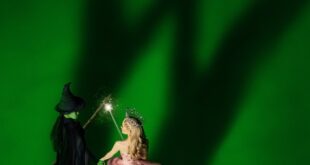It’s an exciting time for film and television lately: although some of those cult classic sci-fi epics aren’t airing anymore, there’s great stuff on TV lately, from Sherlock and Doctor Who to Supernatural, Elementary, and now NBC’s Revolution. And in telling an epic, important kind of story, music is, if not everything, at least a large part of setting the scene and adding to the general epic-ness. That’s why I took the time to have a chat with Christopher Lennertz, the composer behind the exciting new show Revolution.
Hi Chris and thanks for taking the time to talk to me! This is my first time interviewing a composer of any kind, and I also have very little knowledge about how music for film and television is written, so could you start out by talking about what that process is like?
Well, they start out by shooting the show, and then editing it to the point where it makes sense; after that, they give me the show with no music and we go through it together and decide where we want the music and what kind of music we want. After that, I go through each scene and write the music, and then we go and record it with an orchestra.
Building on that, how do you approach writing a piece of music; once you see the scenes and the content, how do you approach fitting that to the music? In short, what’s your artistic method?
The big thing that makes it different in writing for film and television is that, by the time I get to it, the producer usually has some idea of how he or she wants it to sound: scary, emotional, “I like guitars,” “I like violins,” etc…With Revolution, Eric Kripke, who also created Supernatural, and with whom I’ve been friends for a long time, said he wanted it to have a Lord of the Rings kind of sound in terms of being epic, but also with an apocalyptic, a futuristic feel, but also with a bit of medieval music. He wanted a mixture of things. So, we go back and forth and I try to figure out how to mix all of that together.
I’m actually really glad that you brought up Eric Kripke, because I’m a huge fan of his other show, Supernatural, which I know you’ve also worked on. So, what’s it like working with Eric again on this show?
I met Eric when we were both at college and we did a lot of short films and student films together. We worked together a lot, we had a lot of similar tastes , understood how music worked in a show. So we have a long history together. So, working with him, it almost becomes a kind of shorthand because of that. With this show, we’re still working out how it sounds, but working with him, it’s that kind of shorthand.
Can you talk about the differences, stylistically, between the music you’ve written for Supernatural and Revolution? How are the two shows different for you?
Well, Revolution’s much less of a scary show than Supernatural, there are no shapeshifters or any of that stuff. It’s more post-apocalyptic, so you’re in less of a horror mode, more of a drama mode. But also you’re years in the future without power, in a completely different world. Supernatural is a fiction, but it sort of takes place in the real current world. So those things definitely make the sound different.
How did you first become interested in writing music for television (and for cinema and video games?) as opposed to going in a different direction and writing, say, for concerts and a different kind of performance?
I studied composition in college, where I had a chance to study with Elmer Bernstein, who’s an Academy Award winning composer – he’s written things like Ghostbusters and To Kill a Mockingbird. I also apprenticed with some other composers and I started doing smaller projects. And then as people I knew became more successful, I began writing music for their projects. I did a lot of short films, independent films, practice my craft. It sort of developed that way. I’ve been doing it for fifteen years now, so every year hopefully I get better at it, more accustomed to the way it works.
And one final question: could you tell us about any upcoming projects that you’re working on right now?
Right now I’m doing two movies. The first one is called Thanks for Sharing, which premiered at the Toronto Film Festival. It’s a comic drama with Gwyneth Paltrow and it’s all about sex addiction. The second is called Identity Thief, which comes out in February.
 Blogcritics The critical lens on today's culture & entertainment
Blogcritics The critical lens on today's culture & entertainment


